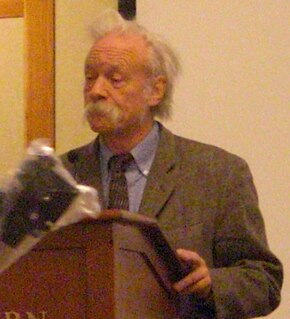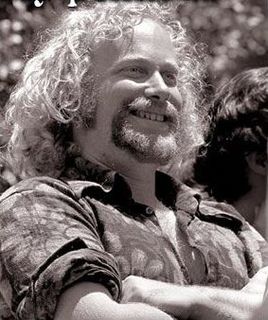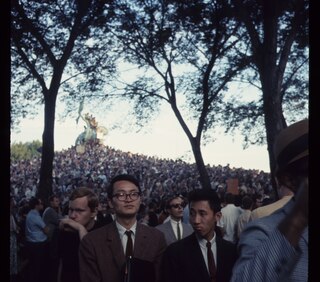This page is based on this
Wikipedia article Text is available under the
CC BY-SA 4.0 license; additional terms may apply.
Images, videos and audio are available under their respective licenses.

The British counter-culture or underground scene developed during the mid 1960s, and was linked to the hippie and subculture of the United States. Its primary focus was around Ladbroke Grove and Notting Hill in London. It generated its own magazines and newspapers, bands, clubs and alternative lifestyle, associated with cannabis and LSD use and a strong socio-political revolutionary agenda to create an alternative society.

Irvin Dana Beal is an American social and political activist, best known for his efforts to legalize marijuana and to promote the benefits of Ibogaine as an addiction treatment. He is a long-term activist in the Youth International Party (Yippies). He founded the Yipster Times in 1972.
The Gastown riot, known also in the plural as Gastown riots, also known as "The Battle of Maple Tree Square", occurred in Vancouver, British Columbia, Canada, on August 7, 1971. Following weeks of arrests by undercover drug squad members in Vancouver as part of a special police operation directed by Mayor Tom Campbell, police attacked a peaceful protest smoke-in in the Gastown neighbourhood. The smoke-in, organized by the Youth International Party against the use of undercover agents and in favour of the legalization of marijuana. Of around two thousand protesters, 79 were arrested and 38 were charged.
Pigasus was a 145-pound (66-kg) domestic pig who was nominated for President of the United States as a theatrical gesture by the Youth International Party on August 23, 1968, just before the opening of the Democratic National Convention in Chicago, Illinois. The youth-oriented party was an anti-establishment and countercultural revolutionary group whose views were inspired by the free speech and anti-war movements of the 1960s, mainly the opposition to United States involvement in the Vietnam War.

Stewart Edward "Stew" Albert was an early member of the Yippies, an anti-Vietnam War political activist, and an important figure in the New Left movement of the 1960s.
The term Woodstock Nation refers specifically to the attendees of the original 1969 Woodstock Music and Arts Festival that took place from August 15–17 on the farm of Max Yasgur near Bethel, New York. It comes from the title of a book written later that year by Yippie activist Abbie Hoffman, describing his experiences at the festival.
The origin of the word is an evolution of the term Yippie, which was coined by the Youth International Party in the 1960s. "Zippie" was briefly the name of the breakaway Yippie faction that demonstrated at the 1972 Republican and Democratic Conventions in Miami Beach.
The hippie subculture began its development as a youth movement in the United States during the early 1960s and then developed around the world.

Protest activity against the Vietnam War took place prior to and during the 1968 Democratic National Convention.

Steven Conliff was a Midwestern-based Native American writer, historian, social satirist, alternative-media publisher and political activist in the 1960s and 1970s.
The "Me" generation in the United States is a term referring to the baby boomers generation and the self-involved qualities that some people associate with it. The 1970s were dubbed the "Me" decade by writer Tom Wolfe; Christopher Lasch was another writer who commented on the rise of a culture of narcissism among the younger generation of that era. The phrase caught on with the general public, at a time when "self-realization" and "self-fulfillment" were becoming cultural aspirations to which young people supposedly ascribed higher importance than social responsibility.

The Love-Ins is a 1967 exploitation film about LSD that was directed by Arthur Dreifuss.

National Lampoon's Class of '86 was a musical comedy stage show, performed at the Village Gate in New York City's Greenwich Village in 1986. It was a spin-off of National Lampoon magazine. A recording of the show was broadcast as part of Showtime Comedy Spotlight on cable television in the 1980s, and it was subsequently available on VHS videocassette. The show's length was about two hours.
Hippie exploitation films are 1960s exploitation films about the hippie counterculture with stereotypical situations associated with the movement such as marijuana and LSD use, sex and wild psychedelic parties.
Judy Clavir Albert, known as Judy Gumbo, is a Canadian-American activist. She was an original member of the Yippies, the Youth International Party, a 1960s counter culture and satirical anti-war group, along with fellow radicals Anita and Abbie Hoffman, Nancy Kurshan and Jerry Rubin, and husband Stew Albert Judy received her nickname, "Gumbo," from Black Panther Party leader Eldridge Cleaver. Cleaver first referred to her as "Mrs. Stew," finding her refusal to use her husband's surname unacceptable. When Judy objected, Cleaver nicknamed her Gumbo, because "Gumbo goes with Stew."








